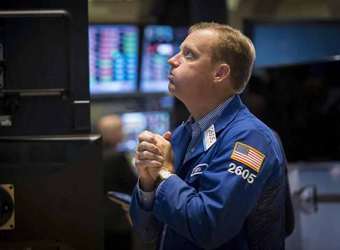U.S. equities fell slightly on Wednesday, with real estate lagging, as the Dow Jones industrial average failed to reach 20,000.
The Dow closed about 30 points lower, with Goldman Sachs contributing the most losses, leaving the index about 60 points below 20,000. The blue-chips index entered the session around 25 points away from hitting the milestone mark. During Tuesday’s session, it briefly came within 13 points of reaching it.
“This is what you’d expect if we were approaching a real technical level. We come very close before breaking above it,” said Randy Frederick, vice president of trading and derivatives at Charles Schwab, noting that 20,000 on the Dow is more of a psychological level.
Mike Bailey, director of research at FBB Capital Partners, said breaking above 20,000 “could generate a new wave of interest” from Main Street. “We focus more on the S&P, but the Dow is certainly the one that gets the most headlines.”
The S&P 500 slipped around 0.25 percent lower, with real estate falling 1 percent, as a massive post-election rally took a breather. Since Nov. 8, the index has risen around 6 percent.
“Sentiment swung to the extreme optimism side. Usually, that signals a pullback,” said Bob Phillips, managing principal at Spectrum Management Group.
The only major economic data released Wednesday were existing home sales for November, which hit 5.61 million units, and weekly mortgage applications, which rose 2.5 percent.
As the holidays approach, investors expect trading volumes to drop significantly, which may lead to volatile swings within the market. “The trains to Manhattan have started to thin out as some market participants have already commenced their holiday vacation plans,” said Jeremy Klein, chief market strategist at FBN Securities, in a note to clients.
Overseas, however, European equities traded mostly lower amid concerns over the stability of the region’s banks. Earlier, Monte dei Paschi di Siena — Italy’s third-largest lender — said it could run out of cash in four months, much faster than the originally forecast 11 months.
Meanwhile, Spanish banks must repay customers more than $4.2 billion after Europe’s top court unexpectedly overturned a Spanish ruling that capped liabilities relating to a disputed mortgage clause, posing a new challenge to some lenders.
Banco Popular, the sector’s weak link and seen as a potential takeover target, faces about $343 million in new charges. Its shares led losses among Spanish banks and fell 5.82 percent.
“Spanish banks have made provisions for what they would have to pay in the event of a negative outcome but with the stocks lower anyway, apparently by not enough. Spanish banks tried to protect themselves from [negative interest rate policy and now will get penalized for it,” said Peter Boockvar, chief market analyst at The Lindsey Group.
In corporate news, Twitter’s CTO Adam Messinger announced is leaving the company after five years. Meanwhile, Amazon was hit by a strike at its German warehouses in a dispute over pay and working conditions. The strike is scheduled to run until Dec. 24.
U.S. Treasurys rose on Wednesday, with the short-term two-year note yielding near 1.2 percent and the benchmark 10-year note yield around 2.55 percent.
In oil markets, U.S. crude settled 1.5 percent lower at $52.49 per barrel after the Energy Information Administration said crude stockpiles rose by 2.3 million barrels last week.
The U.S. dollar fell 0.29 percent against a basket of currencies, with the euro near $1.043 and the yen around 117.5.
The Dow Jones industrial average slipped 32.66 points, or 0.16 percent, to close at 19,941.96, with Merck leading decliners and Nike the biggest riser.
The S&P 500 fell 5.58 points, or 0.25 percent, to end at 2,265.18, with real estate leading eight sectors lower and energy the top advancer.
The Nasdaq composite dropped 12.51 points, or 0.23 percent, to 5,471.43.
Decliners were a step ahead of advancers at the New York Stock Exchange, with an exchange volume of 686.46 million and a composite volume of 2.789 billion at the close.
The CBOE Volatility Index (VIX), widely considered the best gauge of fear in the market, traded near 11.3.
On tap this week:
Thursday
8:30 a.m. Initial claims
8:30 a.m. Durable goods
8:30 a.m. Real GDP
9:00 a.m. FHFA HPI
10:00 a.m. Personal income
Friday
10:00 a.m. New home sales
10:00 a.m. Consumer sentiment
Source: CNBC
